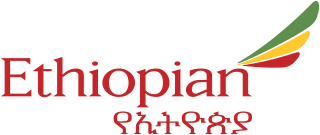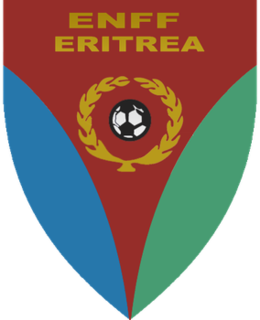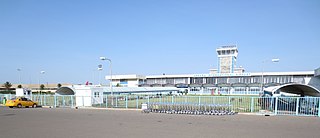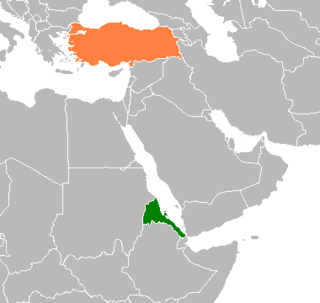Related Research Articles

The Horn of Africa (HoA), also known as the Somali Peninsula, is a large peninsula and geopolitical region in East Africa. Located on the easternmost part of the African mainland, it is the fourth largest peninsula in the world. It is composed of Ethiopia, Eritrea, Somalia and Djibouti; broader definitions also include parts or all of Kenya, Sudan, South Sudan, and Uganda. The term Greater Horn Region (GHR) can additionally include Burundi, Rwanda, and Tanzania. It lies along the southern boundary of the Red Sea and extends hundreds of kilometres into the Guardafui Channel, Gulf of Aden, and Indian Ocean and shares a maritime border with the Arabian Peninsula of Western Asia.

Girma Wolde-Giorgis was an Ethiopian politician who was the president of Ethiopia from 2001 to 2013. He was the second person to hold the office of president since the founding of the Federal Democratic Republic of Ethiopia in 1995.

Ethiopian Airlines, formerly Ethiopian Air Lines (EAL), is the flag carrier of Ethiopia, and is wholly owned by the country's government. EAL was founded on 21 December 1945 and commenced operations on 8 April 1946, expanding to international flights in 1951. The firm became a share company in 1965 and changed its name from Ethiopian Air Lines to Ethiopian Airlines.

The Eritrea national football team represents Eritrea in men's international football and it is controlled by the Eritrean National Football Federation (ENFF). It is nicknamed the Red Sea Boys. It has never qualified for the finals of the FIFA World Cup and the Africa Cup of Nations. Local side Red Sea FC are the main supplier for the national team, The team represents both FIFA and Confederation of African Football (CAF).
Eritrean Airlines is the national airline of Eritrea. Based at Asmara International Airport, it is wholly owned by the government of Eritrea. Scheduled service had been discontinued since 2008, and the airline operated only a few hajj flights every year. The airline was restarted under new management in 2011. In 2011, Nasair, a privately owned company, merged with government-owned Eritrean Airlines, to form Nasair Eritrea. Eritrean Airlines has been banned from flying into the European Union (EU) since December 2012.

The Eritrean–Ethiopian War, also known as the Badme War, was a major armed conflict between Ethiopia and Eritrea that took place from May 1998 to June 2000. The war has its origins in a territorial dispute between the two states. After Eritrea gained independence from Ethiopia, relations were initially friendly. However, disagreements about where the newly created international border should be caused relations to deteriorate significantly, eventually leading to full scale war. According to a 2005 ruling by an international commission, Eritrea broke international law and triggered the war by invading Ethiopia. By 2000, Ethiopia held all of the disputed territory and had advanced into Eritrea. The war officially came to an end with the signing of the Algiers Agreement in 12 December 2000; however, the ensuing border conflict would continue on for nearly two decades.

The Eritrean National Football Federation (E.N.F.F.) is the governing body of football in Eritrea.

Asmara International Airport, IATA: ASM, ICAO: HHAS, is the international airport of Asmara, the capital of Eritrea. It is the country's largest airport and, as of 2017, the only one receiving regularly scheduled services.
Assab International Airport is an international airport in Assab, the capital of the Southern Red Sea region of Eritrea.

Eritrea, officially the State of Eritrea, is a country in the Horn of Africa region of Eastern Africa, with its capital and largest city at Asmara. It is bordered by Ethiopia in the south, Sudan in the west, and Djibouti in the southeast. The northeastern and eastern parts of Eritrea have an extensive coastline along the Red Sea. The nation has a total area of approximately 117,600 km2 (45,406 sq mi), and includes the Dahlak Archipelago and several of the Hanish Islands.
Tourism in Eritrea made up 2% of Eritrea's economy up to 1997. After 1998, revenues from tourism fell to one quarter of 1997 levels. In 2006 it made up less than 1% of the country's GDP. The World Tourism Organization calculated that the country's international tourism receipts in 2002 were just US$73 million. Sources from 2015 states that tourism is limited to the eritrean diaspora and newlywed couples on their honeymoon from Sudan, visiting the capital Asmara. There are also a few curious architects visiting the country. However, the eritrean airline, Eritrean Airlines, has not been allowed to fly international flights due to security breaches as well as sanctions which has led international visitors to rely on airlines such as Qatar Airways and Turkish Airlines to get to the country.

The 2011 Nabro eruption was an eruption of the Nabro stratovolcano in the Southern Red Sea Region of Eritrea, which began on 12 June 2011 after a series of earthquakes. The eruption killed seven and possibly a further 31 people and is estimated to be the highest altitude injection of sulfur dioxide (SO2) ever observed by satellite. The Mount Pinatubo eruption 20 years earlier emitted ten times more SO2. The ash cloud from the eruption reached altitudes which disrupted airline traffic in the region. Until the eruption began, the volcano had no records of historical eruptions.

Ethiopian Airlines Flight 708 was a Boeing 720-060B, due to operate an international scheduled Addis Ababa–Asmara–Athens–Rome–Paris passenger service, that experienced a hijacking attempt on 8 December 1972.
Nova Airways, formerly Nova Airlines, is a passenger airline based in Khartoum, Sudan.

The Eritrean–Ethiopian border conflict was a violent standoff and a proxy conflict between Eritrea and Ethiopia. It consisted of a series of incidents along the then-disputed border; including the Eritrean–Ethiopian War of 1998–2000 and the subsequent Second Afar insurgency. Ethiopia continued to move deeper into Eritrean territory, bringing under occupation the territories incorporated into its 1997 map and demanding that Eritreans living in these areas acquire Ethiopian nationality or leave. Then a fateful incident happened in the Badme area on 6 May 1998: Ethiopian forces attacked an Eritrean platoon on patrol, killing five officers of the Eritrean Defence Forces (EDF). The border conflict was a continuation of the Eritrean–Ethiopian War of 1998–2000. It included multiple clashes with numerous casualties, including the Battle of Tsorona in 2016. Ethiopia stated in 2018 that it would cede Badme to Eritrea. This led to the Eritrea–Ethiopia summit on 9 July 2018, where an agreement was signed which demarcated the border and agreed a resumption of diplomatic relations.
The 2018 Eritrea–Ethiopia summit was a bilateral summit that took place on 8–9 July 2018 in Asmara, Eritrea, between Eritrean President Isaias Afwerki and Ethiopian Prime Minister Abiy Ahmed and officials from the two countries.

Eritrea–Turkey relations are the foreign relations between Eritrea and Turkey. Turkey has an embassy in Asmara since 2013, while Eritrea does not have an embassy in Turkey but the Turkish embassy in Doha, Qatar, is accredited for Eritrea. Turkey was one of the first countries to recognize Eritrea in 1993 and both countries established diplomatic relations in the same year.
References
- ↑ Juma, Victor (27 September 2011). "Kenya: KQ and Eritrea Airlines Set for Turf War Over the Nairobi-Asmara Route". Business Daily Africa. AllAfrica.com. Archived from the original on 7 April 2013.
- ↑ "Profile on Eritrean Airlines". Centre for Aviation. Archived from the original on 4 December 2013. Retrieved 8 October 2012.